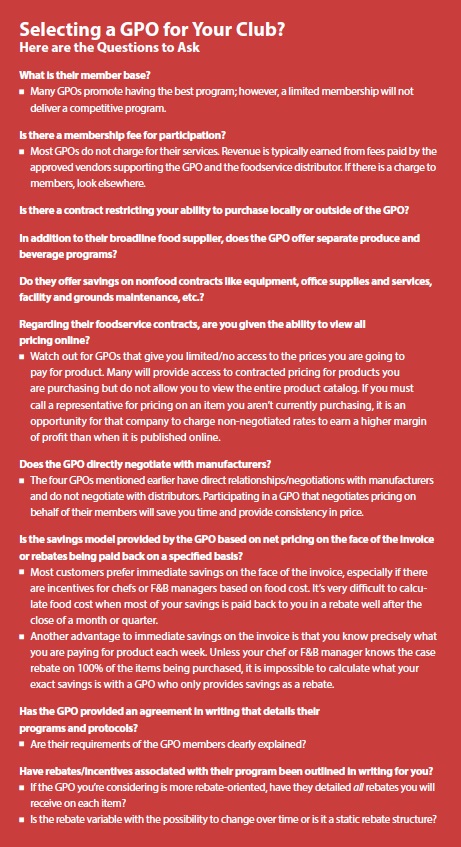With inflation rising, now is the time to look for ways to cut costs. A group purchasing organization (GPO) is one way to realize critical savings at clubs and help club leaders beat the market.
A GPO combines the purchasing volume of a group of businesses (members) and uses that to negotiate better mark-up structures and discounts that result in item level pricing not attainable by most single businesses. There are four group purchasing organizations that are relevant to the golf and club industry: ClubBuy (Premier), Entegra, Avendra and ClubProcure (VGM). Although there are additional GPOs available, these groups offer the most value to clubs.
These four GPOs each have annual purchasing volumes in the billions of dollars, and this purchasing power can have a significant savings impact on clubs. The club industry lags in its utilization of GPOs. The health care industry was one of first to develop purchasing groups and put their aggregated purchasing power to work for their benefit. Today, long-term care facilities, colleges and universities, daycare centers, large resorts and many top multi-course operators (MCOs) utilize a GPO to assist with their procurement needs. Most of these industry groups have enough purchasing power to negotiate deals direct with suppliers, so why do they choose to utilize a GPO? A GPO:
- Works on behalf of their members to negotiate better programs with partnered vendors
- Follows a complete vetting process to ensure credibility and value
- Provides the utmost support for its members—without its members a GPO does not exist
- Delivers detailed reporting
- Reduces cost and provides access to pricing unattainable for independent clubs
- Ensures consistent mark-up and price protection
- Protects members against inflation
- Saves members time and increases efficiencies
- Sometimes offers an employee savings program for members to provide to their employees

The Food Distributor Relationship
Annual sales for most broadline distributors, or one-stop shops, in this industry are split between “street sales” (about 50% to 65%) and national accounts (about 35% to 50%). The more street sales outweigh national accounts, the greater net profits are for the distributor.
There has always been opposition between the national accounts and street sales departments within any broadline distributor. This isn’t expected to diminish any time soon; however, the pressure is increasing on these broadline distributors to increase profits. They are achieving this in many ways such as higher markups, switching quality but keeping the same price, offering smaller pack sizes at the same price, providing fewer split cases, demanding larger drop sizes, increasing fuel and delivery surcharges, and limiting the number of deliveries a customer can receive each week.
A common objection when considering a change to a GPO is that the club’s salesperson is irreplaceable because “we love them … can’t run our business without them … they deliver items to me in their own car in emergencies, etc.” The general perception is that relationships with vendors are lost with the transition from a street sales account to a national account under a GPO program. This is far from the truth; in fact, in most cases, communication and service improve under the watchful eye of a GPO program. Workforce efficiency is also improved as the service a GPO provides on behalf of its members relieves your employees of additional legwork and increases time to focus on their job duties. Your GPO becomes your advocate. They negotiate cost savings in advance on your behalf, assist with sourcing any needs that arise, and aid in resolving vendor-related issues. Clubs are no longer left to do all of this on their own as a standalone business or account. Participating in a GPO means the club is now supported by a company doing millions or even billions of dollars in business with any given vendor!
Nick Barrington, executive chef from East Lake Golf Club in Atlanta, mentioned how these benefits have impacted his business when he said, “I found my GPO program gave me more time to do my job in the kitchen, teaching and educating my staff, as opposed to talking to vendors and continually checking on prices.”
Times have certainly changed and continue to evolve almost daily. The $15+/hour minimum wage is here. We’re already experiencing the effects of inflation and it is continuing an upward trajectory. Supply chain challenges will continue well into 2022. What else is in store that hasn’t come down the pike yet?
If you choose to partner with a national GPO program, keep in mind that many of the suppliers you are using likely have relationships with GPOs, so this does not mean you necessarily have to change suppliers to get better financial benefits and savings for your club. The average savings a club will realize from a GPO is roughly between 10% and 18%, and sometimes more. If your annual spend is, let’s say $300,000, you must consider the question: Is your current vendor worth $30,000 to $55,000 a year to you? Plug your own annual spend into that statement and calculate a 10% to 18% savings value, the question remains.
Mike Manion is national sales manager at Clubhouse Solutions. He can be reached at [email protected].


